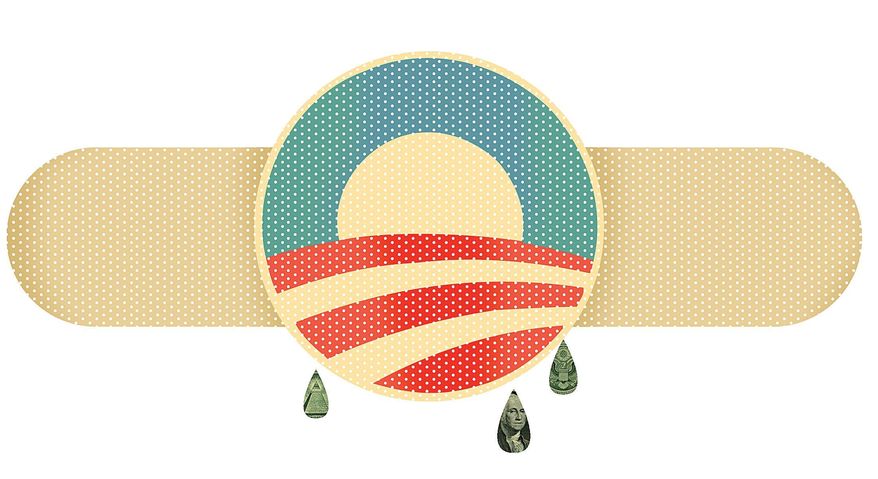 Washington Times, February 27, 2015
Washington Times, February 27, 2015
Obama’s bogus cure for boondoggles
by James Bovard
In the 1930s, peasants who were starving due to the Soviet regime’s brutal farm collectivization policy lamented, “If only Stalin knew.” Nowadays, American social scientists look at floundering federal programs and lament: “If only Congress knew.” The solution, they say, is the “evidence-based” reform movement, which will magically beget a new era of good governance.
“Since its earliest days, the Obama administration has been pursuing the most important initiative in the history of federal attempts to use evidence to improve social programs,” according to Brookings Institute analyst Ron Haskins. Mr. Haskins, the author of “Show Me the Evidence: Obama’s Fight for Rigor and Results in Social Policy,” touts a 2012 Office of Management and Budget memo announcing that federal “programs that can prove their effectiveness with data will be more likely to get the funds they seek.”
The New York Times hailed that memo as “the dawn of the evidence-based budget,” which could be vital to “restoring public trust in government.” Mr. Obama fed this boomlet with a 2011 pledge that “programs are going to be regularly evaluated against a set of clear, high standards.”
Mr. Haskins and groups such as the Coalition for Evidence-Based Policy encourage Americans to believe that because a few federal programs are spending pocket change to evaluate themselves, the government as a whole could soon be far more competent. However, history shows that smoking-gun evidence of boundless boondoggles rarely deters politicians from seizing more power over Americans’ lives.
For instance, the folly of farm subsidies has been obvious for more than 80 years. In 1930, The New York Times, surveying the wreckage of agricultural markets after the federal government tried to drive up wheat prices, concluded, “It is perhaps fortunate for the country that its fingers were so badly burned at the very first trial of the scheme.” But that did not deter President Franklin D. Roosevelt and Congress from making the secretary of agriculture a farm dictator.
Despite an unbroken string of failures, the federal government has continued disrupting agriculture ever since. Politicians create convoluted programs that pay farmers more than their crops are worth, and then launch new interventions spurred by the disruptions caused by suppressing price signals. Most of the agriculture policy mistakes of the past are still being repeated — only the names of the secretaries of agriculture and of the farm-state congressmen have changed.
Foreign aid is the largest laboratory for Mr. Obama’s evidence-based reforms. The president promised in a 2010 United Nations speech to “change the way we do business” with foreign aid, pledging to judge aid programs and budgets “based not on dollars spent, but on outcomes achieved.” The following year, the Agency for International Development (AID) ballyhooed a new evaluation policy for a “transformation based on absolute demand for results.”
That “absolute demand” could not compete, though, with the pressure generated by Mr. Obama’s 2008 campaign pledge to double foreign aid. Boosting spending became far more important than preventing debacles. More than 400 negative findings were deleted from a sample of 12 inspector general audit reports, The Washington Post reported. Acting Inspector General Michael Carroll buried the embarrassing audit findings because he “did not want to create controversy as he awaited Senate confirmation to become the permanent inspector general,” according to some AID auditors.
Mr. Obama’s rhetoric bounced off Agency for International Development’s bureaucratic Teflon. A 2013 Congressional Research Service report quoted one AID bureaucrat: “If you don’t ask [about results], you don’t fail, and your budget isn’t cut.” More than 30 years ago, the General Accounting Office captured AID’s intransigence in a sardonic report title: “Experience — A Potential Tool for Improving U.S. Assistance Abroad.” At least AID’s “fail-and-repeat” tactic provides bureaucratic job security.
“Evidence-based” evaluations have probably been applied to less than 2 percent of federal programs. This is akin to Mr. Obama preening that he will do an honest, balanced analysis on whether the United States should intervene in the tiny African nation of Lesotho — at the same time he ramps up his war efforts in Syria, Iraq, Afghanistan and continues covertly warring in Yemen, Pakistan, and Somalia. The president has simply ignored overwhelming evidence when it did not support his ambition. When he began pushing his Affordable Care Act through Congress in 2009, there was already a proven history of federal intervention inflating medical costs and disrupting health care. Nevertheless, the president was far more concerned with creating a legacy than with learning from Medicare and Medicaid fiascoes.
The “evidence based” reform campaign presumes that politics is essentially a noble business devoted to serving the public. But for politicians, federal programs are fiefdoms. How many kings have abdicated their thrones after becoming convinced that monarchy did not truly serve the downtrodden masses? Will politicians cede power after social scientists document how their favorite programs are a budgetary pestilence?
H.L. Mencken noted that the main concern of elected politicians “is to keep a place at the public trough.” Politicians will always be far more interested in verdicts from voters than from the American Journal of Sociology. There is no reason to expect that fighting waste, fraud and abuse will suddenly become more popular on Capitol Hill than getting re-elected.
• James Bovard is the author of “Attention Deficit Democracy” (Palgrave, 2006) and “Lost Rights” (St. Martin’s, 1994). This article is adapted from The Mises Institute “The Austrian” newsletter.
* Thanks to Linas Garsys for the excellent artwork.
On Twitter @jimbovard

Comments are closed.